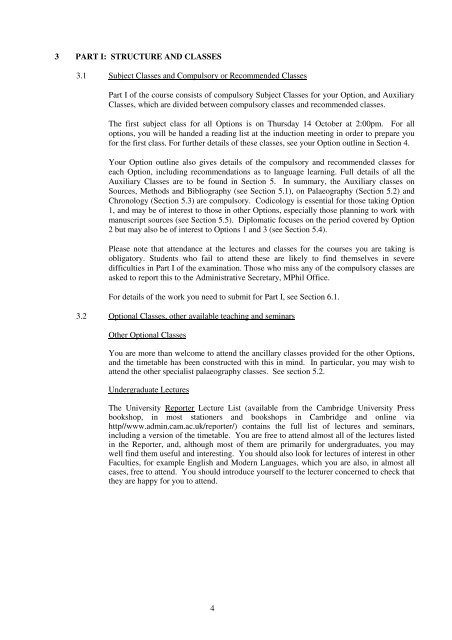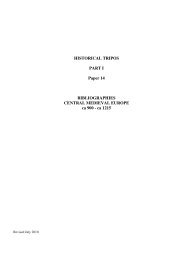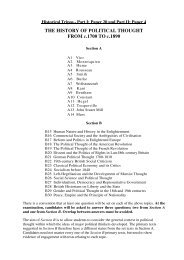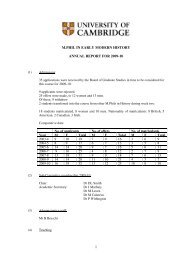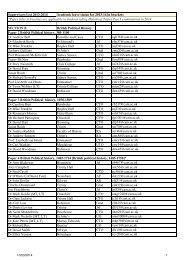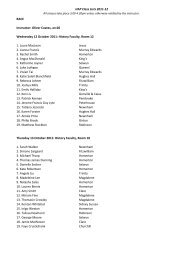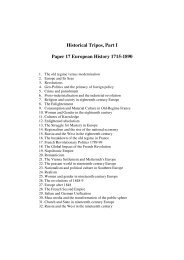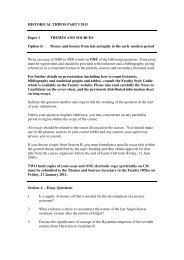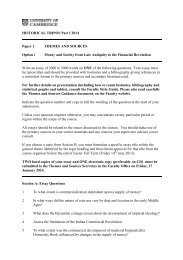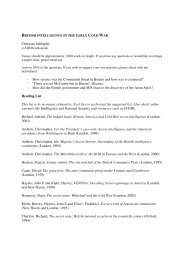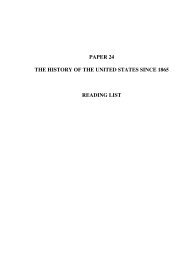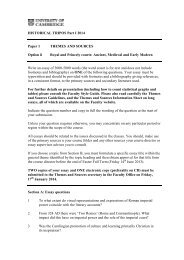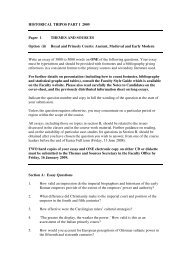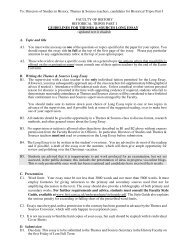Course Handbook - Faculty of History
Course Handbook - Faculty of History
Course Handbook - Faculty of History
You also want an ePaper? Increase the reach of your titles
YUMPU automatically turns print PDFs into web optimized ePapers that Google loves.
3 PART I: STRUCTURE AND CLASSES<br />
3.1 Subject Classes and Compulsory or Recommended Classes<br />
Part I <strong>of</strong> the course consists <strong>of</strong> compulsory Subject Classes for your Option, and Auxiliary<br />
Classes, which are divided between compulsory classes and recommended classes.<br />
The first subject class for all Options is on Thursday 14 October at 2:00pm. For all<br />
options, you will be handed a reading list at the induction meeting in order to prepare you<br />
for the first class. For further details <strong>of</strong> these classes, see your Option outline in Section 4.<br />
Your Option outline also gives details <strong>of</strong> the compulsory and recommended classes for<br />
each Option, including recommendations as to language learning. Full details <strong>of</strong> all the<br />
Auxiliary Classes are to be found in Section 5. In summary, the Auxiliary classes on<br />
Sources, Methods and Bibliography (see Section 5.1), on Palaeography (Section 5.2) and<br />
Chronology (Section 5.3) are compulsory. Codicology is essential for those taking Option<br />
1, and may be <strong>of</strong> interest to those in other Options, especially those planning to work with<br />
manuscript sources (see Section 5.5). Diplomatic focuses on the period covered by Option<br />
2 but may also be <strong>of</strong> interest to Options 1 and 3 (see Section 5.4).<br />
Please note that attendance at the lectures and classes for the courses you are taking is<br />
obligatory. Students who fail to attend these are likely to find themselves in severe<br />
difficulties in Part I <strong>of</strong> the examination. Those who miss any <strong>of</strong> the compulsory classes are<br />
asked to report this to the Administrative Secretary, MPhil Office.<br />
For details <strong>of</strong> the work you need to submit for Part I, see Section 6.1.<br />
3.2 Optional Classes, other available teaching and seminars<br />
Other Optional Classes<br />
You are more than welcome to attend the ancillary classes provided for the other Options,<br />
and the timetable has been constructed with this in mind. In particular, you may wish to<br />
attend the other specialist palaeography classes. See section 5.2.<br />
Undergraduate Lectures<br />
The University Reporter Lecture List (available from the Cambridge University Press<br />
bookshop, in most stationers and bookshops in Cambridge and online via<br />
http//www.admin.cam.ac.uk/reporter/) contains the full list <strong>of</strong> lectures and seminars,<br />
including a version <strong>of</strong> the timetable. You are free to attend almost all <strong>of</strong> the lectures listed<br />
in the Reporter, and, although most <strong>of</strong> them are primarily for undergraduates, you may<br />
well find them useful and interesting. You should also look for lectures <strong>of</strong> interest in other<br />
Faculties, for example English and Modern Languages, which you are also, in almost all<br />
cases, free to attend. You should introduce yourself to the lecturer concerned to check that<br />
they are happy for you to attend.<br />
4


